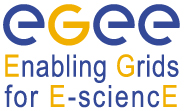Speakers
Abstracts for online demonstrations must provide a summary of the demo content. Places for demos are limited and this summary will be used as part of the selection procedure. Please include the visual impact of the demo and highlight any specific requirements (e.g. network connection). In general, a successful demo is expected to have some supporting material (poster) and be capable of running on a single screen or projector.
We intend to present the modeling solution as a poster during the EGEE event.
Report on the impact of the activity, tool or service. This should include a description of how grid technology enabled or enhanced the result, or how you have enabled or enhanced the infrastructure for other users.
The design and optimization of large scale distributed systems require a realistic description and modeling of the data access patterns, the data flow across the local and wide area networks, and the scheduling and workload presented by hundreds of jobs running concurrently and exchanging very large amounts of data. The simulation framework includes all these aspects, as it was extensively used to test various scheduling algorithms, data transport algorithms and infrastructures, data transfer protocols, replication algorithms, all with interesting results that were used in real-world. As a case study, we present the results obtained in evaluating the performances of DAG scheduling procedures. Our results prove valuable to Grid community (especially for EGEE community) as the choice of scheduling algorithm to be used for task execution could greatly influence the performance of the overall Grid system.
Describe the added value of the grid for your activity, or the value your tool or service adds for other grid users. This should include the scale of the activity and of the potential user community, and the relevance for other scientific or business applications.
Our modeling instrument adds a great value for EGEE developers and users altogether, as it provides the necessary components to design realistic simulations of large-scale distributed systems and offers a flexible and dynamic environment to evaluate the performance of a wide-range of possible Grid architectures. Its simulation model includes all the components and characteristics that allow the complete and accurate design of realistic simulation experiments of complex Grid architectures, consisting of many resources and various technologies, ranging from data transferring to scheduling and data replication, working together to provide a common set of characteristics. The potential use of the described simulator in the design and development of Grid systems is appealing due to its efficiency and scalability. Its core abstractions of process and event map neatly to the components and interactions of modern-day distributed systems and allow designing realistic simulation scenarios.
Describe the activity, tool or service using or enhancing the EGEE infrastructure or results. A high-level description is needed here (Neither a detailed specialist report nor a list of references is required).
We present a modeling framework for evaluating the performance of Grid technologies together with relevant results that demonstrate that our proposed solution can be used to evaluate the performance of scheduling procedures. We consider the general architecture of Grid systems, together with their specific components and characteristics. In addition, the modeling solution includes the necessary concepts to describe various actual Grid technologies in EGEE.




